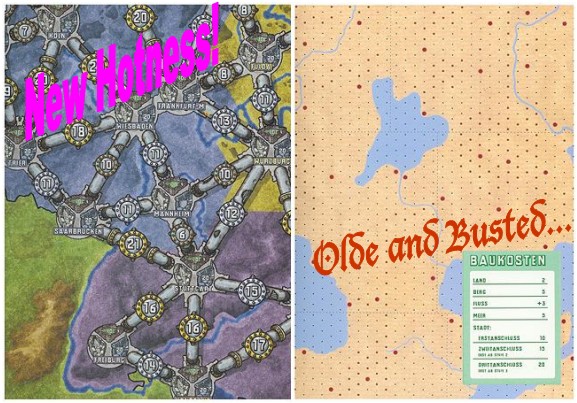August 18, 2006
Polluting has never been this much fun!
Tonight Kristen and I hit the carpet with Power Grid, a game by Friedemann Friese. This game completely blows some other game out of the water. With one exception, Industrial Waste is a much more cleverly themed game (I LOVE the overt references to NIИ!).
In this game, you compete to build the largest functioning powergrid. An alternative way to play is to amass the most money (different from providing the most services). At first, I thought this game was going to be long, redundant, and filled with easy decisions. Ultimately, it was constantly modulating itself to maintain difficulty. Interestingly, it appears that the game goes through several phases of this modulation. It gets progressively more difficult, then it changes format a little bit, gets easy and progresses to harder and then does it again.
The version that Kristen and I played is a new revised edition that has some interesting changes that are more philosophical than they are practical. Here is a comparison of the two boards:

If you're familiar with the Train Game, the concept of the old Power Grid is similar. Only, in Power Grid, the only commodity that you're trading is electricity and you don't need Delivery cards. If you're not familiar with the game, you pay money build a network across the country, connecting cities in your power network. In the new version, the crayons (your power grid) have been eliminated in favor of pre-existing networks. The obvious benefit is the reduction in time of game play by eliminating relatively superfluous choices from game play.
Philosophically, the building costs are functionally similar but do not have the same element of self-determined networks. The ramification is that this new board Americanizes the game (having Germany on one side of the board and the US on the other is a stong indication of Americanization). American board games are designed to give players a limited number of choices, funneling game play into a structured and finite period of time. The European style board game seeks to create a game space where the creativity of the players, potential for collaboration, and fluidity of play are emphasized. It is the American gamer that looks at the side of a box for game play times before they purchase a game. The burning necessity for pragmatism in American games can lend strong characteristics to a game, such as replayability, maintenance of player interest, and timeliness. However, when too strong, it produces games like Monotony Monopoly, Risk, Clue, and Sorry. On the other side are time intensive games that are a waste of time because they are overly dependent on the luck of dice, another favorite Americanism (it eliminates choice by making it for you, just rely on the dice).
Risk 2210 is a cool game. It is better than other forms of risk because the game goes five rounds and then it actually ends. WIth cards and several choices - the game does not depend too much on the role of the dice.
Posted by: Rae at August 20, 2006 11:32 AMOuch - I hate investing so much in a blog entry to find such a small response. The psychology of blogging. . .
Of course- then there those entries we read, enjoy, learn/gain insight from, but have no idea how to respond.